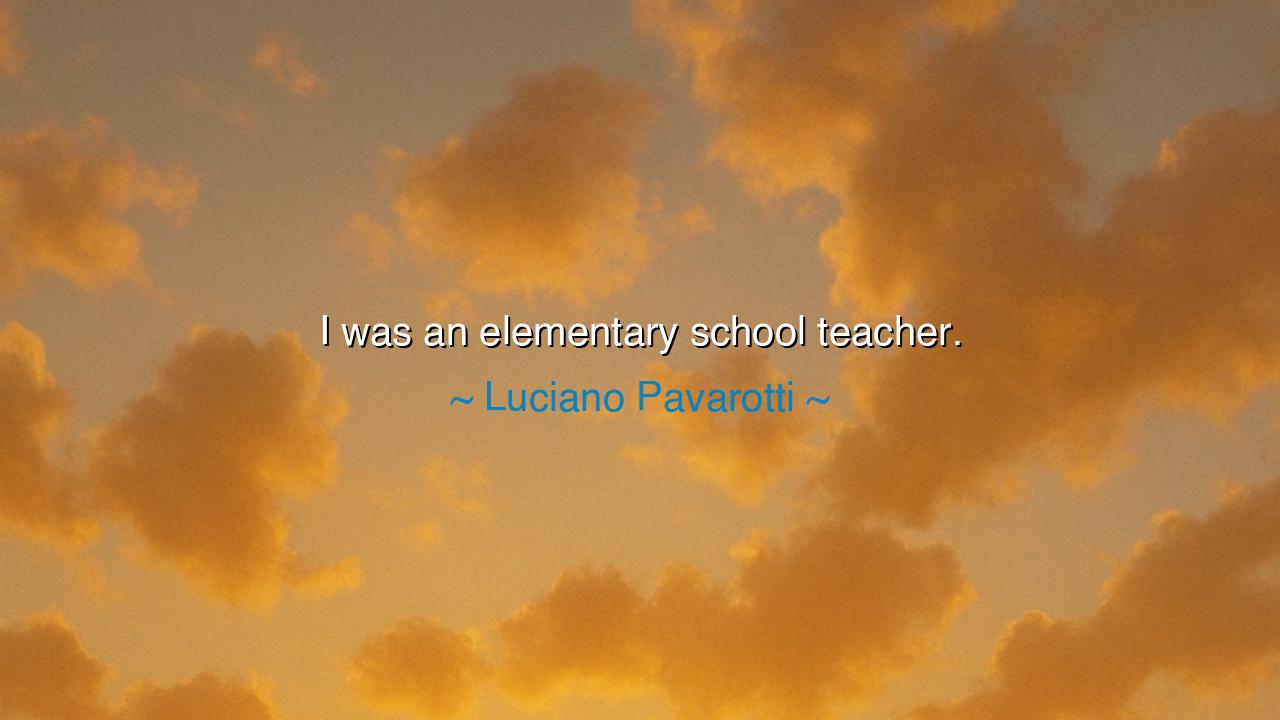
I was an elementary school teacher.






Luciano Pavarotti, the golden voice of Italy, once spoke with disarming simplicity: “I was an elementary school teacher.” To many, this may sound like a passing fact, a modest note in the story of a man who would become one of the greatest tenors in history. Yet beneath these words lies a profound truth: that before his voice soared in the world’s greatest opera houses, he stood in the humble classroom, guiding children, shaping minds, and sowing seeds of learning. His words remind us that greatness often begins not in grandeur, but in simplicity, and that the path to destiny sometimes flows through places we least expect.
The origin of this quote rests in Pavarotti’s youth. Born in Modena, he trained first not for the stage but for the classroom, preparing to dedicate his life to teaching. He taught children their letters, their numbers, their earliest lessons of discipline and joy. Though his destiny would eventually lead him to La Scala, Covent Garden, and the Metropolitan Opera, he carried within him forever the soul of a teacher. In truth, even as a singer, he remained one: instructing through example, inspiring through passion, and guiding both his students and his audiences toward beauty.
This reveals something powerful: that to be a teacher is not merely a profession, but a foundation of the spirit. The patience he learned in the classroom, the ability to listen, to encourage, to nurture — these became the very qualities that gave depth to his art. When he sang, he was not merely performing; he was teaching the world about beauty, about love, about the power of music to lift the human spirit. Thus, his declaration is not only a remembrance, but a testimony: the teacher never truly leaves the man, even when his path changes.
History is filled with such figures who began in humble classrooms before shaping the world. Confucius, one of the greatest sages of China, spent his life teaching small groups of students, yet his wisdom became the foundation of an entire civilization. Leo Tolstoy, before writing his mighty novels, established schools for peasant children, believing education to be as vital as literature. Like Pavarotti, they remind us that the calling of a teacher is often the seedbed of greatness — both for those who teach and for those who are taught.
Pavarotti’s words also remind us of the deep kinship between teaching and art. Both require vulnerability, both demand sincerity, and both depend on the act of giving. A teacher gives knowledge, hope, and confidence. An artist gives beauty, meaning, and inspiration. Neither keeps their treasure for themselves; both pour it out into the lives of others. To say “I was an elementary school teacher” is also to say, “I learned how to give of myself,” and it was that very giving that made his voice not just powerful, but transformative.
The lesson for us is clear: never despise humble beginnings. Do not imagine that greatness requires immediate grandeur. The path of the classroom, the quiet years of service, the hidden labors of preparation — all these shape the soul for its true destiny. Just as the roots of a tree lie unseen yet give strength to its towering branches, so too do the hidden beginnings of our lives give power to our future. Pavarotti’s classroom was his root system, grounding him in patience, service, and humanity before his art reached the skies.
What must you do, then? First, honor your beginnings, no matter how small. Second, recognize the teachers who shaped you, for they gave more than they knew. Third, carry the spirit of the teacher within you, no matter your calling. For whether you are a singer, a builder, a parent, or a friend, you are always teaching those around you through your words, your actions, and your example.
Thus, let Pavarotti’s words echo as more than memory: “I was an elementary school teacher.” In them lies the wisdom that teaching is not left behind when one’s path changes, but remains a guiding force forever. He began in the classroom, but he never ceased to teach — only his classroom grew larger, until it encompassed the world, and his lessons were sung in notes that touched millions of souls. So too may we, in whatever path we walk, carry the teacher’s spirit, and in so doing, leave the world more awake, more alive, and more beautiful.






AAdministratorAdministrator
Welcome, honored guests. Please leave a comment, we will respond soon